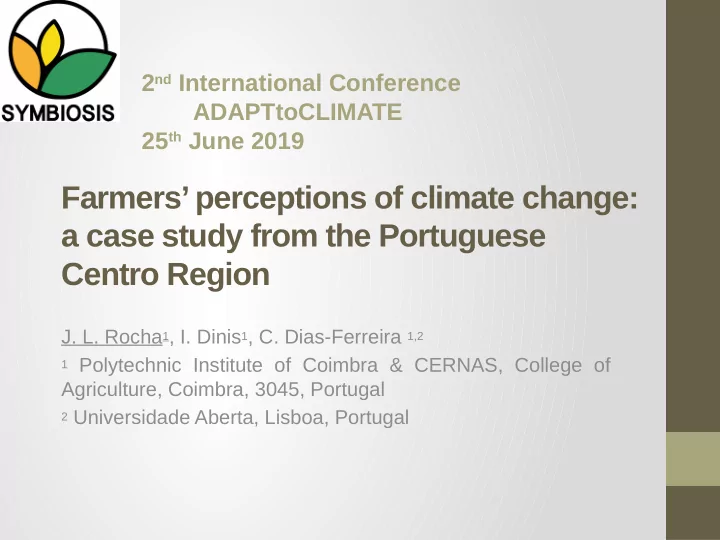

2 nd International Conference ADAPTtoCLIMATE 25 th June 2019 Farmers’ perceptions of climate change: a case study from the Portuguese Centro Region J. L. Rocha 1 , I. Dinis 1 , C. Dias-Ferreira 1,2 1 Polytechnic Institute of Coimbra & CERNAS, College of Agriculture, Coimbra, 3045, Portugal 2 Universidade Aberta, Lisboa, Portugal
Context • Agriculture and livestock production greatly depend on weather conditions • Climate change (CC) projections • Increase of temperature • Droughts • Decrease of precipitation • desertification • Increase of extreme phenomena occurrence 3
Objectives • Assess the farmers’ perception of CC • Assess the farmers’ knowledge and believes related to CC • Assess if more sustainable practices are already being implemented 4
Methodology: study site • The study site is Baixo Mondego located in the Centro region, one of the most fertile regions of Portugal • Surveyed farmers by face-to –face interviews. 5
Methodology: Main crops and livestock • Maize • Dairy farming • Rice 6
Methodology: Survey • Socio-Economic data: gender, education level, off- or on- farm income, land tenure • Agro-livestock data: crops, livestock, organic-waste management, fertilizers use • Changing of agricultural practices data : changing crops, saving water, mulching, direct seeding, reduced tillage • Animal well-being data: improved building structure, ventilation, changing feed 7
Results: Socio-economic Income source Land tenure Education level Own 11,11% Illiterate own 22,22% 22,22% 33,33% and Basic ofg-farm 33,30% rented High 11,11% on-farm own School and 66,70% 55,56% University borred 44,44% Consumption of farm products Farming system Source of information experienc e experienc e and 11,11% 22,22% school 33,33% Agricultur experienc 44,44% e 44,40% e school no 55,60% and agro- 44,44% ye 22,22% dairy others s 8 experienc 22,22% e and others
Results: Agro-livestock Livestock production Cash crops Cattle 11,11% 22,22% 11,01% No Dairy 11,11% Rice Pig 11,11% Maize Shee 11,11% 44,44% p Maize and 11,11% 66,77% Rice Hens Organic-Waste Management Burning and Incorporation 11,11% 11,11% Incorporation 22,22% Incorporation and Mulching 55,56% Incorporation, Mulching and 9 Burning
Results: CC adaptation practices Changed the feed F ans Expanded the area/ improved the building Improved seeds Decreasing fmooding time (rice farmers only) No interest Thinking about doing it Direct seeding Does Changing the type of pesticides Mulching Reduced tillage Water saving 10 0% 20% 40% 60% 80% 100%
Results: CC causes at local level Deforestation local industry Rice farming Maize farming Strongly agrees Vegetable farming Agrees Not sure Disagree Extensive sheep farming Intensive dairy farming Urban development Local transportation 11 0% 10% 20% 30% 40% 50% 60% 70% 80% 90% 100%
Conclusions • All the farmers are aware of CC and its implications • They all have already adopted adaptation practices • Reduced tillage • Incorporation of organic waste in the soil • Improved seeds • Drip irrigation • The reason is economical but the positive impacts on CC are undeniable • They all watch TV and in the last couple of years the amount of programs related to CC has increased 12 significantly
Thank you for your attention For more information Joana Rocha, joanarocha@esac.pt Acknowledgments: This work has been funded by project 0340-SYMBIOSIS-3-E co- funded by FEDER “Fundo Europeu de Desenvolvimento Regional” through Interreg V-A Espan̄a-Portugal (POCTEP) 2014-2020. 13
Recommend
More recommend